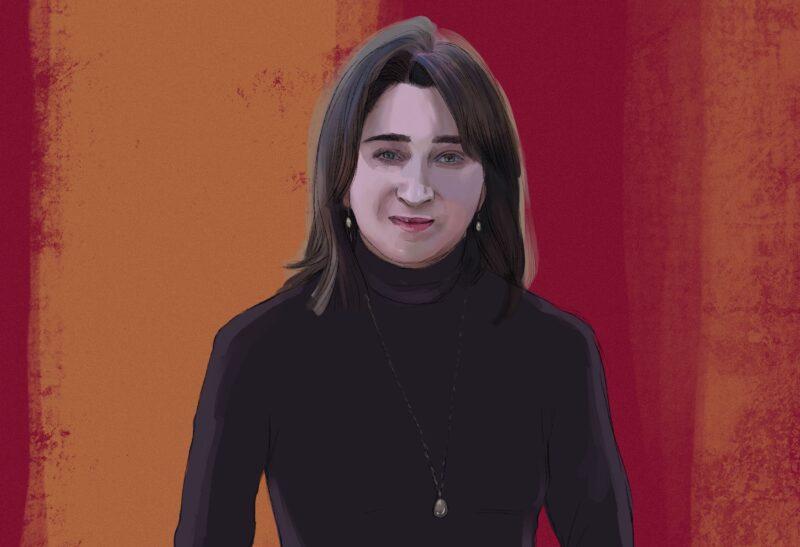It seems he has already forgotten the way to the land he once cultivated. Twenty-six years ago, a resident of Imishli district, Mazakhir Gadzhialiev, received a land share from the state, totaling 1 hectare and 20 acres. For several years, this plot was his primary source of income, but due to a lack of resources, he handed it over to his cousin.
Mazakhir explains several reasons why he doesn’t tend to the land himself, with the main one being its location approximately 10 kilometers away from his home. He lives in the center of Imishli city, while the plot is in the village of Jafarli in the same district. Accessing it is only possible by car, and since Mazakhir doesn’t have his own vehicle, he has to rely on calling a taxi every time.
“Firstly, I don’t have the financial means. Secondly, the plot is far away, 10 kilometers distant. How can I go there without a car? And I need to go there 2-3 times a week, which I can’t manage. Each trip costs around 5 manats. So, I have to pay 5 manats for a one-way taxi ride, where can I get that much money from.”
To show us his plot, Mazakhir Gadzhiev calls for a taxi, negotiating a fare of 10 manats with the driver to take him to the village of Jafarli and back.
Throughout the journey, he talks about the high cost of living and complains that finding work is practically impossible. He recounts his numerous attempts to seek assistance from the State Employment Agency, yet he has achieved no results. Now, at the age of 50 and feeling trapped, he’s compelled to work as a casual laborer. He occasionally gets some gigs a few times a month—pouring concrete or digging graves—and barely manages to make a living. But if there are no jobs at all in any given month, he’s left in dire straits.
Job seekers, but not unemployed
Mazakhir cannot secure steady employment as he is not classified as unemployed.
According to the “Employment Law,” individuals who own a land share or are members of a family farm are not considered unemployed. However, they are entitled to professional training, participation in public works, and self-employment. While the law doesn’t label them as unemployed, they can be listed as job seekers. Mazakhir Gadzhialiev decided to take advantage of this opportunity. He has approached the Mil-Mugan Regional Office of the State Employment Agency several times.

“I tried to register with the agency in 2018, but it didn’t work out. They would say come back tomorrow, then in 10 days, then in a month. Finally, they said to gather these documents. So, I did. Then I received an SMS saying that since I have a land in my name, I’m not eligible,” Gadzhialiev recounts his story. “During the pandemic, the government was providing benefits to the unemployed. Well, I applied, and again they responded: you have land in your name… There were three of us in the family, and none of us could receive these benefits because the land was registered in our names. That’s why we were denied.”
Mazakhir Gadzhialiev approached the regional branch of the Employment Agency in 2018, 2020, and 2022. According to him, each time he was put through a prolonged process, only to be told that his documents were not in order.
In response to Meydan TV’s inquiry, the State Employment Agency stated that Mazakhir Gadzhialiev’s self-employment application submitted in 2022 was not registered due to his fault. According to the agency, Gadzhialiev left before the assessment of employment opportunities. There was no mention made regarding applications from previous years.
"Applications for participation in the self-employment program can be submitted by individuals registered as unemployed (excluding those receiving unemployment insurance benefits), as well as individuals who own agricultural land but do not have other employment and are registered as job seekers. Under this program, the State Employment Agency provides assistance to the unemployed and job seekers who have the desire, minimum potential, skills, and a general understanding, as well as individuals with limited working ability, to create their own family farms and small businesses. This is done by providing assets directly in the form of goods and materials using state funds."
“After that, a dark streak began for us.”
After traveling just over 10 kilometers, the taxi drops us off in the village of Jafarli. Mazakhir praises the fertility of the allocated land plot but laments his inability to use it.
“Our collective farm has set its sights on this place. The land here is wonderful; it’s just that finances don’t allow me to come here and plant whatever I want. Although you can plant anything you desire, circumstances simply don’t permit it.”
Mazakhir Gadzhialiev has two daughters. His wife, in order to supplement the family budget, toils during the season weeding cotton fields. He shares that after losing his son in 2008, he suffered shock and fell ill.
“After that, a dark streak began for us. I was sick for three years. So, everything went awry. I couldn’t do anything.”
Because he didn’t obtain a death certificate for his son at the time, Mazakhir also lost the government subsidy he used to receive. Due to financial difficulties, he’s unable to arrange the documents properly.
“Until last year, I received [the subsidy], but this year they didn’t give it to me. For this, all documents are needed. The documents contain the name of my son, but he passed away. Because I didn’t receive a death certificate, the process stalled. And now they tell me, go, get the certificate in court. And the court says you need to pay 100 manats [about $59] in fees. But I don’t have these 100 manats to pay and get the paper. So, this year I remained without the subsidy.”
How is the real level of unemployment concealed?
Economist Farid Mehralizade highlights that the government doesn’t monitor the actual use of shared lands, thus the official unemployment rate doesn’t reflect the truth. According to him, the official recognition of individuals with land shares as employed distorts the real picture of unemployment.

“According to the latest data, around 1,750,000 people are employed in agriculture in Azerbaijan. The country has an economically active population of 5,300,000. Of these, slightly over 30% are in agriculture. However, we do not know how many of these individuals are actually working. I believe such an approach is one of the main reasons for underestimating the real unemployment level in Azerbaijan.
For many years, according to official data, the unemployment rate in Azerbaijan has been around 6%. However, neither independent experts nor ordinary citizens believe in the accuracy of these figures; they are skeptical about them. As we have mentioned, one reason for these low numbers is that people who own land shares are considered employed. Therefore, I think the government must conduct research to find out whether these lands are being utilized or not”
Farid Mehralizade adds that in some regions of Azerbaijan, especially in mountainous areas, the amount of arable land available is quite limited. In such cases, the amount of land per capita becomes very small. Even if a farmer cultivates this land, they may not earn a monthly income equivalent to the minimum wage from this small area.
“On the other hand, the inability to register as unemployed hinders the use of certain benefits or other mechanisms of social policy. This, to some extent, although not entirely, is a problem even when receiving targeted social assistance. Indeed, those who own a land share can still receive targeted social assistance under certain conditions. However, they will have to go through more bureaucratic work and prepare various documents. This approach thus complicates the process of obtaining targeted social assistance.”
Members of Parliament are aware of the problem. Vahid Ahmedov, a member of the parliamentary committee on economic policy, industry, and entrepreneurship, says that both he and other fellow deputies have received appeals from citizens regarding this issue. According to him, discussions are ongoing in parliament about providing social benefits to individuals who own land shares, and positive steps are expected in the near future to change the situation for the better.
“In general, social protection and certain issues related to targeted social assistance are subjects of discussion. If someone owns a land share or an old ‘Zhiguli’ car, they do not receive social assistance as entrepreneurs. But for one person, the land plot may be a hectare, and for another – two hundred square meters. The one who has a whole hectare, of course, should cultivate and use that land. But if you have 3-5 hundred square meters of land, you can’t do anything with it. Such cases need to be distinguished. Some people have small plots that are unsuitable for agriculture. Of course, they can be considered unemployed. However, those with a lot of land should certainly cultivate it.”
3.7 million people are not recognized by the government as unemployed.
Economist Farid Mehralizade also lists other factors that allow the real level of unemployment in Azerbaijan to be hidden. He states that alongside landowners, individuals with an active tax identification number (TIN) and men and women engaged in household activities are also considered employed, contributing to the concealment of the true extent of unemployment.
“One of the most important categories includes small entrepreneurs with a TIN. According to recent data, there are about 1.1 million of them. However, according to our legislation, if you have an active TIN, regardless of whether funds are deposited into your account or not, you are considered employed, not unemployed.
Another aspect concerns people engaged in household activities, with a registered population of around 750,000 in the country. I believe the government needs to conduct research to determine how many of them chose household work due to unemployment.
It’s difficult to determine the current actual level of unemployment in the country. However, at least it can be stated that 1.9 million people owning land plots, 1.1 million with an active TIN, and about 700,000 men and women engaged in household activities, totaling 3.7 million people, are not recognized by the government as unemployed. However, there are suspicions that a significant portion of these 3.7 million people actually do not have work. Certainly, if the government studies and discloses the real financial situation of these 3.7 million people, it is likely that the official unemployment rate in the country will increase.”
The Three-Wheeled Dream
A proposed amendment to the “Unemployment Insurance Law,” discussed on November 4th at a joint session of the parliamentary committees on labor and social policy and the committee on economic policy, industry, and entrepreneurship, will allow citizens owning land shares to receive unemployment insurance benefits. Local media have circulated this news without providing any details. The parliament’s website also lacks information about the specifics of this amendment. Questions posed by Meydan TV to representatives of these committees also remained unanswered.
Meanwhile, Mazakhir Gadzhialiev believes that under the current circumstances, having a mode of transport could assist him in cultivating his land. Upon learning about the services offered to unemployed citizens under the self-employment program, he desires the government to provide him with at least a three-wheeled motorcycle to commute to and from his land.
This material was prepared with the support of the “MediaSet.”



